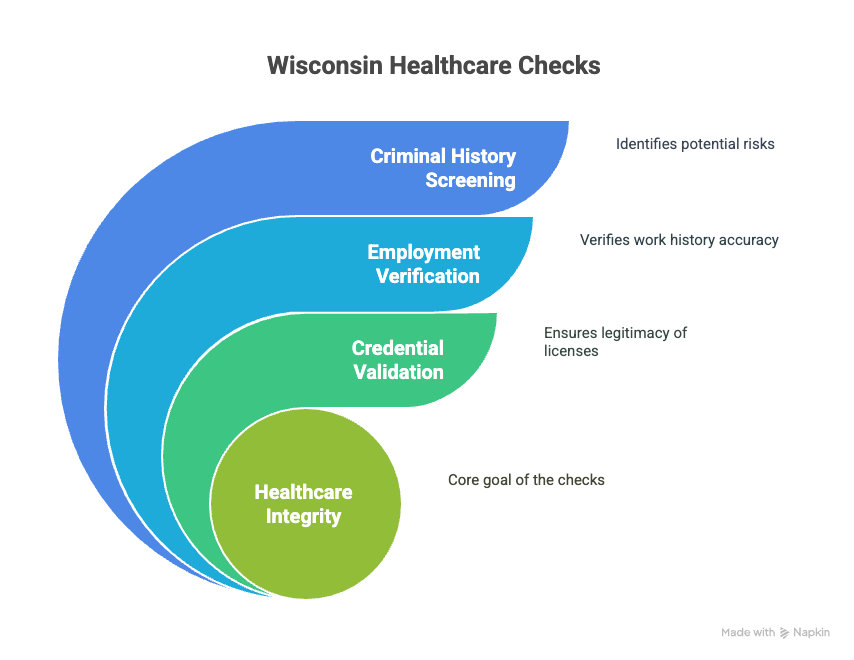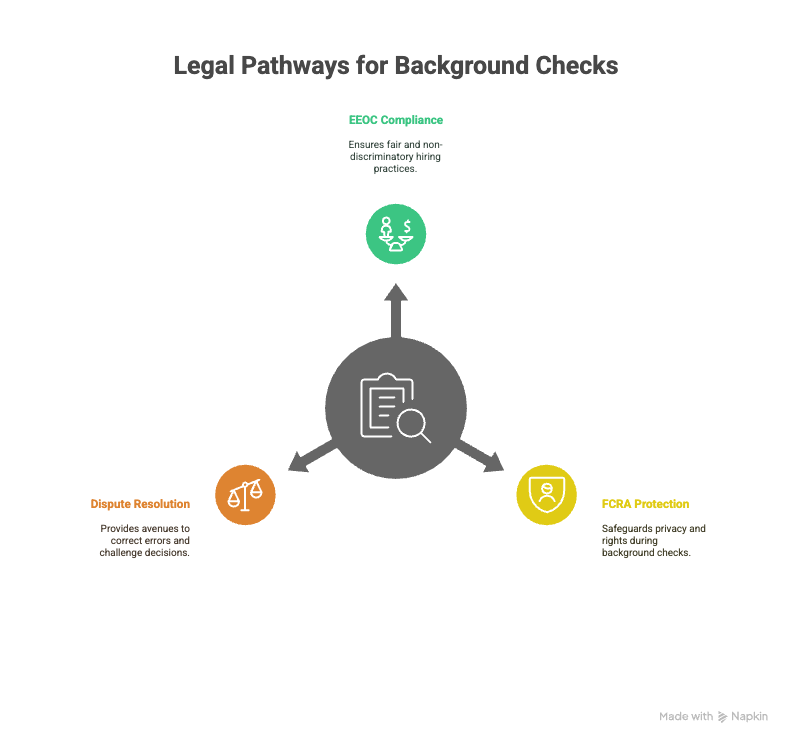Navigating the path to becoming a healthcare professional in Wisconsin involves more than just academic qualifications and clinical training. One crucial element that often catches many by surprise is the requirement for thorough background checks. These checks are designed to ensure that only individuals with the highest integrity and safety standards are entrusted with the care of Wisconsinâs residents. This guide delves into the specific requirements set forth by the Wisconsin Board of Nursing, covering key aspects such as the types of checks involved, their implications, and what aspiring nurses and caregivers should expect.
Key Takeaways
- Background checks in Wisconsin are essential for ensuring high standards and public safety in healthcare.
- The Wisconsin Board of Nursing requires detailed checks on criminal history, employment, and credentials for nurse licensing.
- Some criminal offenses may disqualify caregivers, but there's a process for appeals and corrections.
- Completing educational programs, passing exams, and undergoing background checks are all part of the nursing license process.
- Legal guidelines, such as those from the EEOC and FCRA, ensure fair and private handling of background checks.
Introduction
Background checks are a critical part of the healthcare industry, especially for those aspiring to join the nursing profession. They are integral in safeguarding public trust and ensuring patient safety. By thoroughly vetting professionals, these checks help maintain high standards in the medical field and protect healthcare recipients from potential harm.
In Wisconsin, healthcare background checks cover various aspects such as criminal history, employment verification, and credentials validation. These are not merely procedural requirements; they serve as a testament to a candidateâs fitness for providing care. For nurses and caregivers, understanding these checks is crucial. They are not just about eligibility but reflect the commitment to upholding the highest integrity in oneâs professional duties.
This guide will explore the Wisconsin Board of Nursing's specific requirements for background checks. It will dissect key components, discuss their implications for healthcare workers, and provide practical insights. Aspiring nurses and caregivers will find valuable information here to navigate this essential part of their professional journey.
Understanding Wisconsin Healthcare Checks
Wisconsin healthcare checks are not just a formality. They are a detailed examination of an applicantâs background to ensure that individuals in healthcare roles meet stringent ethical and professional standards. These checks typically involve three key components: criminal history screening, employment verification, and credential validation.

Criminal history checks aim to identify any past behaviors that may pose a risk to patient safety or compromise the integrity of the healthcare environment. For instance, a conviction for fraud or violent crimes could disqualify an applicant. The goal is to protect patients and maintain a trustworthy healthcare system.
Employment verification confirms that applicants have accurately represented their work history. This step helps in verifying claims about past responsibilities and experience. For example, embellishing a previous roleâs scope can lead to serious consequences if uncovered during this process.
Credential validation is crucial, ensuring that all licenses and certifications are legitimate and up to date. This step is particularly important given that practitioners work in environments where professional competence can affect patient outcomes.
Understanding the significance of these checks is vital for anyone pursuing a healthcare career in Wisconsin. They are not just about meeting regulatory requirements; they are about upholding the trust placed in healthcare professionals. Are you prepared to demonstrate the integrity and professionalism these roles demand?
Board of Nursing Requirements for WI Nurse Licensing
Navigating the licensing process for nurses in Wisconsin is intricate, yet manageable when well-prepared. One critical requirement is the background check, a non-negotiable step that ensures only qualified and trustworthy individuals enter the profession.
When applying for your nursing license, you will undergo a comprehensive background check. This involves a review of your criminal record, fingerprinting, and verification of your educational credentials. It's not just about spotting red flags; it's about safeguarding patient trust. Felony convictions, serious misdemeanors, or any actions that reflect dishonest or unethical conduct, such as fraud, can disqualify you. However, each case is evaluated on its own merits, considering factors like rehabilitation and the time elapsed since the offense.
The Wisconsin Board of Nursing mandates these checks to protect patients and maintain high ethical standards within the healthcare sector. They help keep the workforce composed of individuals who meet the strict benchmarks of professional conduct and responsibility.
Preparation is crucial. Ensure all your paperwork is current and accurate. If you've had any legal issues in the past, be ready to discuss them transparently. Gather any documents that demonstrate attempts at rehabilitation. This proactive approach can ease the process and prevent unnecessary delays.
Start your preparation early, and maintain open communication with the Board if you have concerns about your background. This lays a foundation for a successful license acquisition, positioning you to serve with integrity in Wisconsinâs healthcare system.
Caregiver Disqualifications in Wisconsin
Caregivers play a significant role in Wisconsin's healthcare system, providing essential support and care to those in need. However, not everyone qualifies for this trusted position. Disqualifications often come into play, mainly due to specific offenses and irregularities.
Certain criminal convictions can lead to disqualification. Felonies involving violence, abuse, or neglect are red flags. Fraudulent activities, especially those involving falsification of credentials, are also taken seriously. The aim is to ensure that caregivers have both the moral and ethical capacity to care for vulnerable populations.
The disqualification process begins with a thorough background check, which includes reviewing criminal records and other relevant history. State agencies perform these checks diligently, requiring candidates to provide full disclosure of past incidents. Any discrepancies or concerning findings trigger further investigation.
If you find yourself disqualified, knowing your rights is crucial. Wisconsin law provides avenues for appeal. You can request a review of your case, present additional information, or correct inaccuracies in your record. Understanding and navigating this process can be key to presenting your side and potentially overturning a disqualification.
By being informed and prepared, you can reduce the risk of disqualification and ensure your path to becoming a caregiver remains clear.
WI Nurse Licensing Process: A Closer Look
Securing a nursing license in Wisconsin requires navigating a multi-step process. Each stage ensures that future nurses meet all necessary standards and are fully equipped to provide high-quality care. Here's what you can expect.
- Education Requirements: Begin by completing an accredited nursing program. These programs are tailored to provide both theoretical knowledge and practical skills.
- Application Submission: After fulfilling educational requirements, submit your application to the Wisconsin Board of Nursing. This includes necessary documentation such as transcripts and identification.
- Background Checks: Background checks are integral in this phase. You undergo checks focusing on criminal history and social security trace. These typically occur after application submission but before licensing exams.
- Examinations: Next, prepare for the NCLEX-RN. This is the national examination for aspiring registered nurses. Passing it is a vital step toward your license.
- License Issuance: Once you've cleared the exams and background checks, the Board reviews your complete application. If all is in order, they issue your nursing license.
Challenges and Pitfalls: Delays in background check outcomes can stall your progress. To avoid setbacks, ensure all information is accurate and your records are clear. If you encounter issues, proactively communicate with the Board for guidance.
A well-prepared approach makes these steps more manageable and helps avoid any unexpected hurdles along the way.
Legal Considerations
Background checks for employment, including nurse licensing in Wisconsin, must align with guidelines from the Equal Employment Opportunity Commission (EEOC). These guidelines ensure checks are executed fairly and without discrimination. Employers, including health boards, cannot use information in a way that disproportionately excludes people of a specific race, national origin, or other protected class. When assessing an applicant's criminal history, only relevant offenses should be considered in relation to the role they're applying for. This ensures hiring decisions focus on qualifications and not solely past mistakes.
Your privacy during a background check is crucial. Entities conducting these checks must adhere to the Fair Credit Reporting Act (FCRA), which safeguards how your information is collected and used. You're notified when a background check is requested, and you must consent before it proceeds. The FCRA also grants you the right to review and dispute incorrect information, providing a buffer against errors that could affect employment opportunities.

If you believe you've been incorrectly disqualified due to an error in your background check, you have options. First, obtain a copy of the check from the reporting agency. Review it for inaccuracies and provide evidence to correct any mistakes. If the issue persists, you can file a complaint with the EEOC or consult legal counsel for further assistance. Employers making adverse employment decisions based on background checks also owe you a copy of the report, along with a summary of your rights under the FCRA, allowing you to thoroughly review and act upon any discrepancies.
Conclusion
Thorough background checks play a crucial role in ensuring that healthcare professionals uphold the highest standards of integrity and safety. They serve as a safeguard to protect patients and maintain public trust in those who deliver essential health services. It's vital for healthcare workers to prepare well in advance. Understanding the specific requirements of the Wisconsin Board of Nursing can help you avoid unnecessary delays or disqualifications when pursuing a career. By being proactive, you can ensure a smoother path to meeting these rigorous standards and becoming a trusted member of the healthcare community in Wisconsin. These processes ultimately work to protect the well-being of the people who rely on healthcare services, reaffirming the commitment to their health and safety.
Frequently Asked Questions (FAQs)
What crimes disqualify nurses in WI?
In Wisconsin, crimes such as homicide, sexual assault, and certain drug offenses can disqualify you from obtaining a nursing license. Convictions like fraud or abuse may also impact eligibility.
How long do WI nursing checks take?
Background checks in Wisconsin typically take between one to three weeks, depending on the complexity of the check and the volume of applications.
Can a DUI affect a nursing license in WI?
Yes, a DUI can affect your nursing license in Wisconsin. The state evaluates on a case-by-case basis, considering the severity and frequency of offenses.
Does Wisconsin accept out-of-state healthcare checks?
Wisconsin may accept out-of-state background checks if they meet the same standards as in-state checks. It's advised to confirm this with the Wisconsin Department of Safety and Professional Services.
How to appeal a denied WI nursing license?
You can appeal by submitting a written request outlining why you believe the decision should be reconsidered. Include supporting documentation and contact the Board for guidance on the process.
Are expunged records visible to WI medical boards?
Expunged records are not typically visible to Wisconsin medical boards. However, boards might inquire about expunged records, so it's wise to be forthcoming if asked.
Do WI hospitals require FBI checks?
Many Wisconsin hospitals require FBI background checks, especially if you're working in sensitive areas like pediatrics or geriatrics.
Whatâs the cost of healthcare checks in Wisconsin?
The cost varies but generally ranges from $15 to $50. This may include state and federal checks, depending on the requirements.
Can you work in healthcare with a misdemeanor in WI?
You can work in healthcare with a misdemeanor in Wisconsin, but it depends on the nature of the offense and your role. Each application is reviewed individually.
Does WI check the National Practitioner Data Bank?
Yes, Wisconsin does check the National Practitioner Data Bank to ensure the integrity and qualifications of healthcare professionals.
Do I need continuing education to maintain my WI nursing license?
Yes, continuing education is typically required to maintain your nursing license in Wisconsin. The requirements vary based on your specialty and area of practice.
How often do I need to renew my nursing license in Wisconsin?
You need to renew your nursing license every two years in Wisconsin. Ensure you complete all necessary requirements before the expiration date.
Can nursing students in WI work before getting licensed?
Nursing students can work in certain healthcare roles, such as nursing assistants, while completing their education. Licensing is required to practice as a registered nurse.
Are there volunteer opportunities for nurses in Wisconsin?
Yes, there are numerous volunteer opportunities available for nurses in Wisconsin, ranging from community health events to disaster relief efforts.
Definitions
Background Check
A background check is a review of a personâs criminal, professional, and sometimes financial history. Employers, licensing boards, or agencies use it to ensure candidates are trustworthy and suitable for specific roles. In healthcare, checks often include fingerprinting, criminal history, and verification of credentials. For example, a nursing applicant in Wisconsin will need to pass a background check to earn a license.
Credential Validation
Credential validation confirms that a person's licenses, degrees, and certifications are valid and current. It helps ensure that healthcare workers are qualified for their responsibilities. This step protects patients and upholds professional standards. For instance, the Wisconsin Board of Nursing checks that nursing licenses are active and granted by accredited institutions.
Employment Verification
Employment verification checks past job titles, roles, and dates of employment. Employers and licensing boards use this to confirm that applicants have represented their work history honestly. If someone claims to have been a nurse supervisor but only worked as an assistant, this process will reveal the truth.
Disqualification
Disqualification means being ruled ineligible for a job or license due to certain issues, often found during a background check. These might include criminal offenses, false credentials, or ethical violations. In Wisconsin, someone with a felony for elder abuse could be disqualified from working as a caregiver. However, people can appeal or provide context if they believe a decision was unfair.
Fair Credit Reporting Act (FCRA)
The FCRA is a federal law that protects your rights during background checks for jobs and licenses. It requires that you give written consent before a check happens. If information from your report is used to deny you a job or license, you have the right to see it, dispute mistakes, and fix them. This law ensures fairness and accuracy in decisions that affect your career.
References
- Wisconsin DSPS Official Licensing Requirements:
https://dsps.wi.gov/Credentialing/Health/info3087.pdf - Vivian Health: Wisconsin RN Licensing Guide:
https://www.vivian.com/licensing/nursing/wisconsin/

GCheck Editorial Team
Meet the GCheck Editorial Team, your trusted source for insightful and up-to-date information in the world of employment background checks. Committed to delivering the latest trends, best practices, and industry insights, our team is dedicated to keeping you informed.
With a passion for ensuring accuracy, compliance, and efficiency in background screening, we are your go-to experts in the field. Stay tuned for our comprehensive articles, guides, and analysis, designed to empower businesses and individuals with the knowledge they need to make informed decisions.
At GCheck, we're here to guide you through the complexities of background checks, every step of the way.





